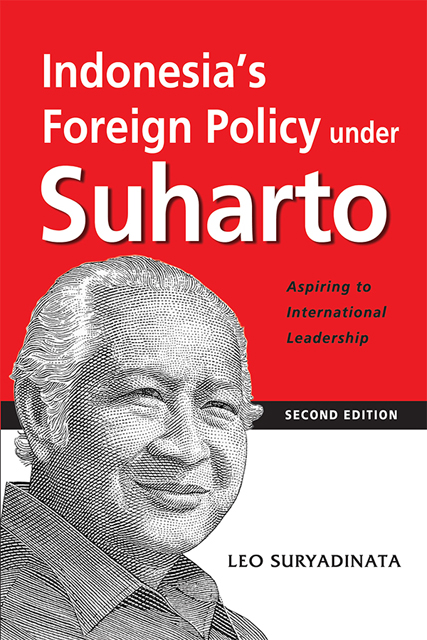Book contents
- Frontmatter
- Contents
- Preface to the Second Edition
- Preface
- Acknowledgements
- Introduction: Suharto’s Foreign Policy
- 1 Determinants of Indonesia’s Foreign Policy: In Search of an Explanation
- 2 Indonesia’s Foreign Policy before the New Order: In Search of a Format
- 3 Indonesia’s Foreign Policy during the “New Order” (I): The Rise of the Military
- 4 Indonesia’s Foreign Policy during the “New Order” (II): The Assertive Role of the President
- 5 Indonesia’s Relations with the ASEAN States: Regional Stability and Leadership Role
- 6 Indonesia’s Relations with Australia and Papua New Guinea: Security and Cultural Issues
- 7 Indonesia-China Relations: Ideology, Ethnic Chinese and the President
- 8 Indonesia-Vietnam Relations and the Kampuchean Issue: The Security Factor
- 9 Indonesia-Superpower Relations: Economic and Non-Economic Factors
- 10 Indonesia, the Middle East and Bosnia: Islam and Foreign Policy
- 11 Indonesia, the Non-Aligned Movement and APEC: In Search of a Leadership Role
- Conclusion: To Lead and Not to Be Led
- Postscript: Indonesia’s Foreign Policy from the Fall of Suharto to Joko Widodo: Still Aspiring to International Leadership?
- Bibliography
- Appendices
- Index
8 - Indonesia-Vietnam Relations and the Kampuchean Issue: The Security Factor
Published online by Cambridge University Press: 01 September 2023
- Frontmatter
- Contents
- Preface to the Second Edition
- Preface
- Acknowledgements
- Introduction: Suharto’s Foreign Policy
- 1 Determinants of Indonesia’s Foreign Policy: In Search of an Explanation
- 2 Indonesia’s Foreign Policy before the New Order: In Search of a Format
- 3 Indonesia’s Foreign Policy during the “New Order” (I): The Rise of the Military
- 4 Indonesia’s Foreign Policy during the “New Order” (II): The Assertive Role of the President
- 5 Indonesia’s Relations with the ASEAN States: Regional Stability and Leadership Role
- 6 Indonesia’s Relations with Australia and Papua New Guinea: Security and Cultural Issues
- 7 Indonesia-China Relations: Ideology, Ethnic Chinese and the President
- 8 Indonesia-Vietnam Relations and the Kampuchean Issue: The Security Factor
- 9 Indonesia-Superpower Relations: Economic and Non-Economic Factors
- 10 Indonesia, the Middle East and Bosnia: Islam and Foreign Policy
- 11 Indonesia, the Non-Aligned Movement and APEC: In Search of a Leadership Role
- Conclusion: To Lead and Not to Be Led
- Postscript: Indonesia’s Foreign Policy from the Fall of Suharto to Joko Widodo: Still Aspiring to International Leadership?
- Bibliography
- Appendices
- Index
Summary
Introduction
Indonesia and Vietnam share a common historical experience in that these two Southeast Asian countries achieved their independence through revolution, and the leaders of each country have emphasized this point from time to time. They have even argued that this common experience has formed the basis of Indonesia-Vietnam relations. How true is this assertion? What is the nature of their relations? Has Communist ideology been a major factor in the relations between Communist Vietnam and anti-Communist Indonesia? What has really determined bilateral ties? What has been the role of Suharto in Indonesia’s policy towards Vietnam? And last but not least, what are the prospects for the future?
Origins of Relations
Indonesia has had informal contacts with Vietnam since the 1940s. Diplomatic ties between Jakarta and Hanoi were only established after the Afro-Asian Conference in Bandung. Jakarta set up a Consulate-General in Hanoi in December 1955, three months after it had established a Consulate-General in Saigon. This policy of equidistance to the two Vietnams was abandoned during the Sukarno period when revolutionary fervour was rising and Indonesia’s foreign policy was moving towards the left.
In 1959, Ho Chi Minh was invited to visit Indonesia and was given an honorary degree by a regional Indonesian university. In the same year, Sukarno returned the visit. When the Vietnam war escalated, members of the Indonesian elite, many of whom had been involved in the anti-colonial movement, sympathized with the North Vietnamese. Many of them saw the South Vietnamese as American puppets. On 10 August 1964, Sukarno finally decided to upgrade diplomatic relations between Jakarta and Hanoi from consulate to ambassadorial level. This led to the suspension of diplomatic ties between Jakarta and Saigon, and the Indonesian consulate in Saigon was closed. Soon after, Indonesia decided to recognize the National Liberation Front of South Vietnam (NLFSV) and allowed the establishment of its representative office in Jakarta. Indonesian relations with Communist states, including North Vietnam, became much closer. Together with the PRC, they formed what was known as the Jakarta-Hanoi-Phnom Penh-Beijing-Pyongyang axis. This was the so-called honeymoon period, not only between Indonesia and the PRC, but also between Indonesia and North Vietnam.
- Type
- Chapter
- Information
- Indonesia's Foreign Policy under SuhartoAspiring to International Leadership, pp. 122 - 137Publisher: ISEAS–Yusof Ishak InstituteFirst published in: 2023



